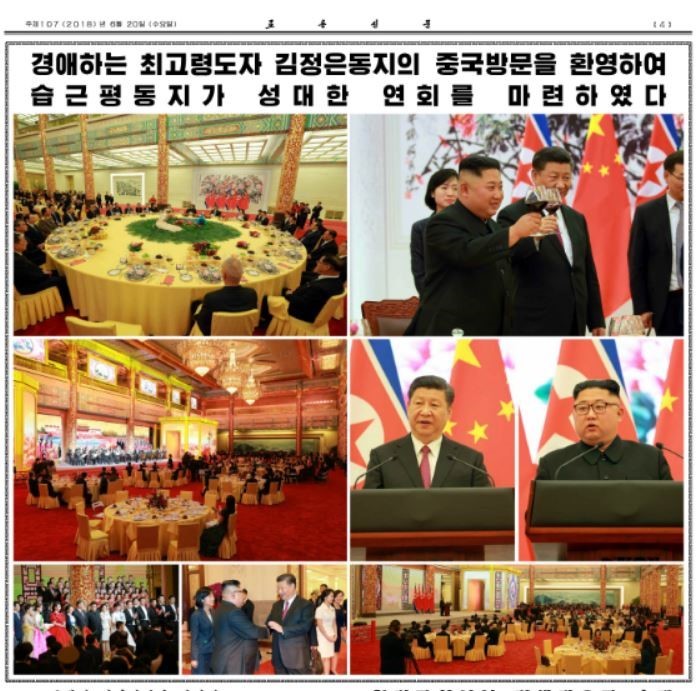 |
|
The first four of six total pages in the June 20 edition of North Korea’s state-run Rodong Sinmun were dedicated to the news from the first day of Kim’s visit to China, including 28 photographs
|
Media coverage and rhetoric in both countries indicates new phase in North Korea-China relations
On June 20, North Korean state-run media including the Rodong Sinmun and the Korean Central News Agency gave considerable attention to North Korean leader Kim Jong-un’s third visit to China. The first four of six total pages in the June 20 edition of the Rodong Sinmun were dedicated to the news from the first day of Kim’s visit to China, including 28 photographs. While this is Kim’s third visit to China this year, it was the first time that the North Korean media broke the story before his visit was even over. One notable aspect of the Rodong Sinmun’s reporting is the emphasis that Kim and Chinese President Xi Jinping placed on North Korea-China relations. “We will cooperate closely together in ‘one staff department’ with our Chinese comrades on the journey of defending socialism and ushering in a new future on the Korean Peninsula and in the region,” the Rodong Sinmun quoted Kim as saying during a banquet held at the Great Hall of the People in Beijing after his meeting with Xi. In response, Xi said that Kim’s visit to China had “showed the whole world the invincibility of the relationship between the two countries and parties of China and North Korea.” Notably, this was the first mention of the concepts of “one staff department” (by Kim) and “invincibility” (by Xi) during the course of their three summits. Such political rhetoric implies that North Korea and China are on the same side and are together in all respects. Indeed, Kim’s rhetoric about North Korea-China relations has grown bolder over time, from “strengthening strategic and tactical collaboration” during his first visit in March to “moving forward while firmly clasping the hands of our affectionate Chinese comrades” during his second visit in May to “one staff department” in his most recent visit. Xi’s remarks about the relationship have changed, too, from “unique in the world” in March to “a community of destiny, an unchanging relationship of lips and teeth” in May to “invincibility” on this visit. Building a mirror image of South Korea-US relations “Kim Jong-un appears to want to develop the North Korea-China relationship into one that is as strong as the US-South Korea alliance,” said a former high-ranking South Korean government official who is familiar with North Korea-China relations. According to this perspective, Kim means to balance South Korea’s alliance with the US and its friendly cooperative relationship with China by forging a semi-alliance with China and a friendly cooperative relationship with the US. (China does not use the word “alliance.”) “Kim Jong-un’s strategy of strengthening North Korea’s relations with China is designed with the time after denuclearization in mind. He seems to want to build a relationship with China that would be a mirror image of South Korea-US relations,” said former Unification Minister Lee Jong-seok, who is also an expert in North Korea-China affairs, shortly after Kim’s second visit to China. These experts regard Kim as a cool-headed pragmatist who puts more trust in “objective dynamic relations” than in “good will.” The impression he is giving, they say, is that “birds of a feather flock together.” During their meeting at the Great Hall of the People, Kim and Xi shared the results of the North Korea-US summit and their positions, assessments and views about those results, the Rodong Sinmun reported. The newspaper also said that Kim and Xi traded their opinions about several matters of common interest, including prospects for achieving denuclearization on the Korean Peninsula, and arrived at a shared viewpoint about the issues discussed. Kim expressed his “gratitude for the enthusiastic and sincere support and outstanding assistance given” by China in regard to the North Korea-US summit, the Rodong Sinmun reported, while Xi said that he “actively supports the North Koreans’ position and resolution to achieve denuclearization on the Korean Peninsula.” Xi was also quoted as saying that “China will continue to play a constructive role in the future as well.” Only three North Koreans were present at Kim and Xi’s meeting, just as in the previous meetings in March and May: Kim Yong-chol and Ri Su-yong, both vice chairmen of the Workers’ Party of Korea, and Foreign Minister Ri Yong-ho. By Lee Je-hun, senior staff writer Please direct comments or questions to [english@hani.co.kr]






